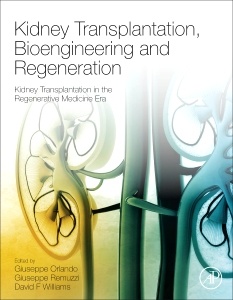Kidney Transplantation, Bioengineering, and Regeneration Kidney Transplantation in the Regenerative Medicine Era
Coordonnateurs : Orlando Giuseppe, Remuzzi Giuseppe, Williams David F.

Kidney Transplantation, Bioengineering, and Regeneration: Kidney Transplantation in the Regenerative Medicine Era investigates how the field of regenerative medicine is changing the traditional premises of solid organ transplantation, specifically within the field of kidney transplantation. In Section 1, chapters illustrate the state of the art in kidney transplantation as well as the research behind the bioengineering and regeneration of kidney organoids for therapeutic renal replacement.
In Section II, chapters catalog the technologies that are being developed and the methods that are being implemented to bioengineer or regenerate kidneys in order to restore function, while critically highlighting those technological advances which hold the most promise. The book thus encompasses clinical renal transplantation, tissue engineering, biomaterial sciences, stem cell biology, and developmental biology, as they are all applied to the kidney.
PART I: Kidney Transplantation Section I: Epidemiology of kidney disease and transplantation Section II: Donor selection and allocation Section III: Kidney preservation and transplant procedures Section IV: Kidney recipients and transplant Section V: Transplantation immunology and immunomodulation Section VI: Graft monitoring tools Section VII: Post-transplant immune events Section VIII: Early and late complications Section IX: Long-term outcomes Section X: Transplant issues and specific patients Section XI: Ethics and costs Section XII: Unmet needs
PART II: Kidney Bioengineering and Repair Section I: Introduction Section II: Bioengineering Section III: Bioreactors and biomaterials Section IV: Regeneration Section V: Adult cells for regeneration Section VI: Cell therapy for renal tissue repair Section VII: Future Perspectives
Professor of Nephrology, Director of the Department of Medicine of the Ospedali Riuniti di Bergamo (Papa Giovanni XXIII Hospital), Italy and Director of the Division of Nephrology and Dialysis of the same hospital. He also directs the Negri Bergamo Laboratories of the “Mario Negri Institute for Pharmacological Research, a group of basic scientists and clinicians devoted to the study of human renal diseases and their corresponding animal models from the perspective of pathophysiology and therapeutic intervention. He touched major advances in many areas of nephrology. For example, his studies have led to new insights into many disorders, including the interactions between platelets and endothelium, pathophysiology of glomerular diseases and the factors that influence the progressive loss of kidney function. Work focused on improving the outlook for patients with end stage renal disease. Giuseppe Remuzzi pays tribute to the work of pioneers such as Barry Brenner, who delved deep into the processes behind glomerular function and their possible reversibility. Early work on the use of angiotensin-converting enzyme inhibitors to slow the decline of glomerular filtration rates proved dialysis was avoidable, not inevitable. Studies on immunologic mechanisms that influence the survival of transplanted organs, understanding of immunologic tolerance in the disorders that are linked to autoimmunity and finally, genetic diseases of the kidney have also been areas of investigatio
- Focuses on the synergy between renal organ transplantation and regenerative medicine, highlighting the advances within transplantation, bioengineering, regeneration, and repair
- Educates the transplant community on important regenerative medicine research pertinent to kidney transplantation
- Develops a shared language for clinicians, surgeons, and basic researchers to reach across the fields of transplantation and regenerative medicine, and facilitate more productive investigation and research
- Catalogs the technologies being developed and methods being implemented to bioengineer or regenerate kidneys to restore function
Date de parution : 08-2017
Ouvrage de 1252 p.
21.4x27.6 cm
Thèmes de Kidney Transplantation, Bioengineering, and Regeneration :
Mots-clés :
ABO incompatibility; ABO incompatible; AKI; ASKP1240; Acute antibody-mediated rejection; Acute cellular rejection; Acute humoral rejection; Acute kidney injury; Acute rejection; Adaptive; Adaptive immunity; Age-matching; Alloantibodies; Alloantigen recognition; Allograft; Allograft survival; Allorecognition; Alport syndrome; Amniotic fluid cells; Amniotic fluid progenitor cells; Amniotic fluid stem cells; And regeneration; AngII; Angiocrine signaling; Angiotensin II inhibitors; Anti-IL-2 receptor monoclonal antibodies; Antibody-mediated rejection; Antiglomerular basement membrane disease; Antiproliferative agents; Antithymocyte globulins; Asymptomatic bacteriuria; Atacicept; Atherosclerosis; Autoimmunity; Banff criteria; Basement membrane; Belatacept; Belimumab; Bioartifical kidney; Bioartificial kidney; Biocompatibility; Bioengineered organs; Biofabrication technologies; Biological markers; Biomarker; Biomarkers; Biomaterials; Biomimetic microenvironment; Biopsy; Bioreactor; Blastocyst complementation; Blending; Bone marrow transplantation; Brain death; Branching morphogenesis; C1 esterase inhibitor; C4d staining; CAKUT; CD133; CKD; CNI-toxicity; Calcineurin inhibitors; Cancer; Cancer after kidney transplantation; Cap mesenchyme; Carbon monoxide; Cardiovascular disease; Cardiovascular evaluation; Carfilzomib; Cell printing; Cell therapy; Cellular rejection; Cellular therapies; Central venous pressure monitoring; Chaperone; Chimerism; Chronic hemodialysis inflammation; Chronic kidney disease; Chronic kidney diseases; Chronic rejection; Chronic renal allograft injury; Clinical tolerance induction; Cold ischemia time; Comorbidity; Confetti construct; Contraindication; Controlled parameters; Copolymer; Corticosteroids; Crossmatching; Cx43; Cystatin-C; Cytomegalovirus; DDR1; De novo disease; De novo renal disease; De-novo organ generation; Death with functioning graft; Deceased donor kidney transplantation; Deceased donors



